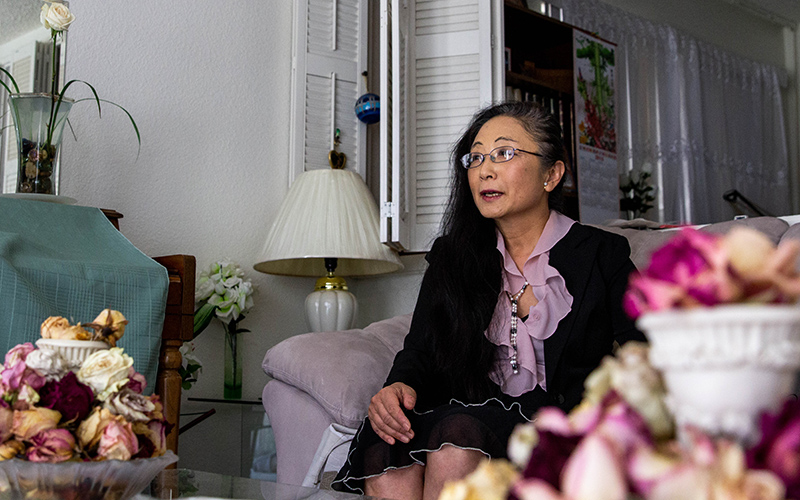
Professor Wei Li moved to the United States in 1988 and became a citizen in 2000. She thinks the Kavanaugh confirmation hearings have a global impact. (Photo by Daisy Finch/Cronkite News)
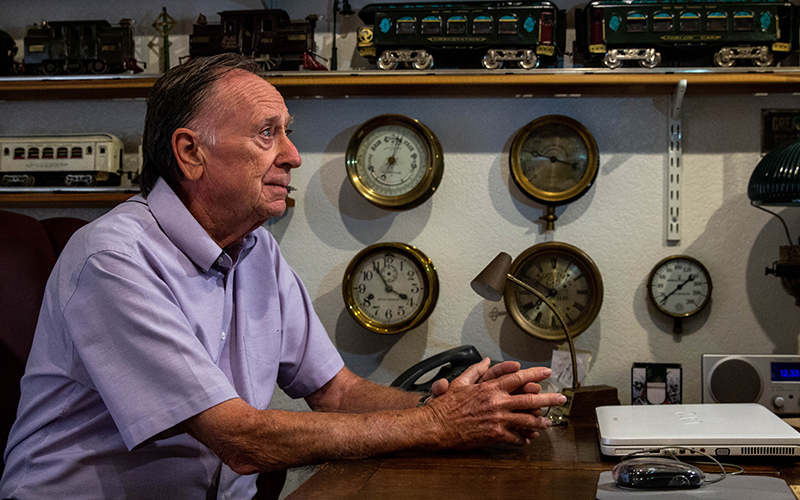
John Craft is an ASU professor and Cronkite Gallery curator who kept his television tuned to the Kavanaugh hearings on Thursday. (Photo by Daisy Finch/Cronkite News)
TEMPE – On a regular weekday, Professor Wei Li would be teaching her students in the School of Social Transformation at Arizona State University. But Thursday, she stayed home, laptop on hand and tea nearby, with her TV tuned to the extraordinary hearing in the confirmation of Brett Kavanaugh to the Supreme Court.
“I don’t have teaching today nor do I have meetings, so I thought today’s the perfect time for me to stay home and juggle between watching the hearing and doing other work,” Li said, with her laptop and TV remote beside her.
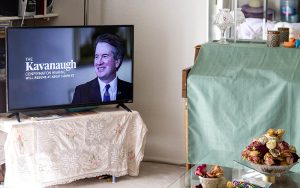
ASU Professor Wei Li watched the Clarence Thomas-Anita Hill faceoff in 1991 when she was a student new to the U.S. Staying at home to watch the Kavanaugh hearing was a high priority for her. (Photo by Daisy Finch/Cronkite News)
Twenty-seven years ago, Li found herself “glued” to her television for a different hearing – one held for Clarence Thomas, who now sits on the Supreme Court, in which Anita Hill, his subordinate at a federal agency, testified about sexual harassment in the workplace.
“I feel compelled (to watch), mainly because the U.S. Supreme Court is the ultimate decision-maker in terms of our judiciary system, and it can impact so many people’s lives,” Li said. “This is a lifetime appointment, so I think that it’s critically important for the person eventually confirmed to have the integrity and to have the qualifications, and probably more importantly, have people’s trust.
“Back then, I was a relatively new international student and basically had a very limited understanding, so I wanted to watch it. That particular hearing really struck me in terms of how Professor Anita Hill was treated by essentially all white, male senators. I felt that was so unfair, the ways in which she was treated.”
Li sees this as an important civic lesson for everyone.
“I teach my international students if they come here not to just get a U.S. degree, but to learn about the U.S. as a country, as a culture,” she said. “Some of them may think, OK, this is the U.S. We are on temporary visas. We don’t have a vote, so whatever, doesn’t matter to us.’ But as a lot of incidents show, like the travel ban, like many other policies federally or locally or at the state level, it could impact every single person.”
Another professor kept up with the Kavanaugh hearing today from home. John Craft, professor at the Walter Cronkite School of Journalism and Mass Communication and curator of the Cronkite Gallery, emphasized the importance of the hearing on a historical scale.
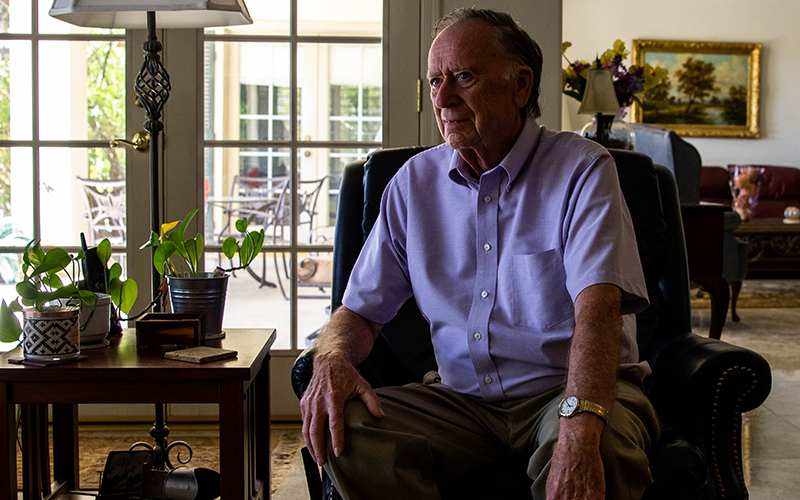
“Unfortunately, those who really should be seeing this probably aren’t watching today. The ones who know the process are really probably part of the audience,” ASU Professor John Craft said, referring to Thursday’s coverage of the Kavanaugh hearings. (Photo by Daisy Finch/Cronkite News)
“I think it’s an incredibly important use of television because it gives the public an idea of what actually goes on behind the scenes in Congress and the Senate, in this case,” Craft said. “It probably won’t get the same audiences that the very first ones had, in terms of percentage (of viewers). In 1950, the Kefauver hearings and then, a little bit later, the Army-McCarthy hearings, were very important. … The only thing on television at that time was those hearings. There were less television sets then, but percentage-wise, more people watched than are watching this one.”
A Supreme Court justice holds the position for life; Craft emphasized that it’s one of the most important positions in government.
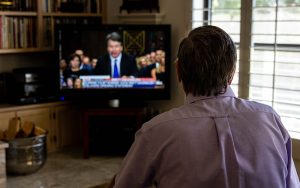
“I’m not sure we teach as much about civics and the American process as we have in the past,” ASU Professor John Craft said. He emphasized the historical significance of the Kavanaugh hearings. (Photo by Daisy Finch/Cronkite News)
“Presidents come and go, and their theories and policies come and go, but once the Supreme Court has made a decision on a particular law, that stays with us for years and years and years. So we have to be very careful about who we put on that Supreme Court.”
Craft said most viewers “are watching this type of programming for the dramatic appeal within it.”
“We don’t know what’s going to happen next, so that becomes very interesting to a lot of people,” he said. “Whether that causes them to change their mind is doubtful. They have probably, based on what they have heard from friends and neighbors, already made up their minds as to what really they think about the individuals.”
The hearing was a hot topic on social media, and classrooms around the country aired or discussed the hearing. Li believes it’s important on a global scale.
“The divide is always there. But right now, in the current political environment, I feel the divide is blown to the surface, making it harder for anyone to consider what is fair and what is justice to anyone,” she said.
– Video by Bryce Newberry